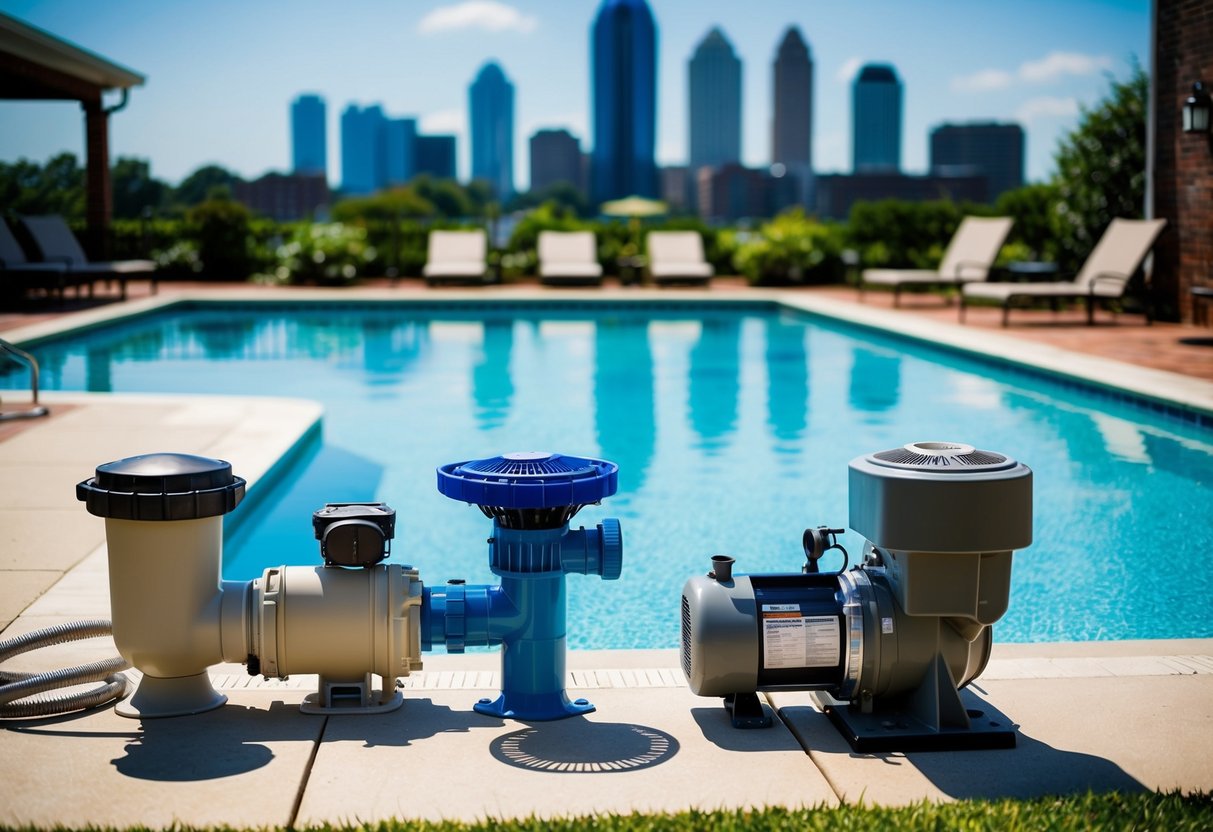Understanding Pool Maintenance Fundamentals

When taking care of our pools, two key elements are maintaining the right water chemistry and keeping everything clean. Paying attention to these two areas keeps our pool water safe and clear. Let’s dive into more depth.
Water Chemistry Balance
Keeping the pool’s water chemistry balanced is crucial. We need to regularly test the water to check pH, alkalinity, and sanitizer levels. pH levels should be between 7.2 and 7.6. If not, our pool can become uncomfortable to swim in and might damage the equipment.
For the sanitizer, usually chlorine, it’s important that the level stays around 1-3 ppm. This makes sure the pool is safe from germs. Testing these levels at least twice a week is a good habit.
Alkalinity should be between 80 and 120 ppm to support the pH balance. An imbalance in these can lead to cloudy water or even skin irritation. We have to adjust these levels using chemicals designed for pools.
Regular Cleaning Routines
A clean pool isn’t just about aesthetics; it’s also about health and safety. We should skim leaves and debris from the pool surface daily. Regular vacuuming helps remove dirt from the bottom of the pool, ensuring it stays clean.
Brushing the pool walls helps prevent algae growth. It’s important to clean out the skimmer and pump baskets regularly. This ensures proper water circulation and keeps equipment working efficiently.
We should also backwash the filter as needed. It’s a simple process that can significantly improve filtration effectiveness. Keeping to a regular cleaning schedule helps us maintain a safe, inviting pool.
Pool Equipment Upkeep

Regular maintenance of pool equipment is vital for smooth operation and efficiency. Ensuring filters and pumps work correctly can lengthen their lifespan and boost performance.
Filter Maintenance for Optimal Performance
Filters are an essential part of any pool system, keeping water clean and free from debris. We should backwash sand and DE filters regularly to remove built-up contaminants. Cartridge filters require periodic cleaning by removing and rinsing the cartridge with a hose. It’s also wise to replace the filter when it shows signs of wear or becomes damaged. Proper filter maintenance will result in clearer, healthier pool water.
Pool Pump and Heating System Care
The pool pump is crucial for water circulation. We must check for leaks, unusual noises, or vibrations to ensure it’s running efficiently. Cleaning pump strainer baskets is important too and should be done frequently. Regular inspection and servicing are key to avoiding breakdowns. As for heating systems, inspecting the gas lines, burners, and pressure settings ensures efficient operation. Keeping these components in top shape can prevent costly repairs and extend the equipment’s longevity.
Seasonal Pool Care Considerations in Atlanta

In Atlanta, specific challenges arise with each season, requiring us to adjust our pool care routines. Addressing algae growth in the hot summers and preparing our pools for the mild winters are crucial tasks.
Managing Algae Growth During Summers
Atlanta summers are hot and humid, creating the perfect conditions for algae to flourish. To prevent algae, we should monitor and balance the pool’s pH and chlorine levels regularly. A pH level between 7.2 and 7.6 keeps the pool friendly for swimming while maintaining chlorine’s effectiveness.
Brushing the pool walls helps remove any algae beginning to form, while running the pool pump for at least 8-12 hours daily ensures good water circulation. We can also use algaecide as a preventive measure, applying it weekly or as needed based on the algae risk and pool usage. Keeping floating debris out using a pool cover when not in use can also reduce organic matter that aids algae growth. By tackling these tasks diligently, our pool remains clear and inviting throughout the summer.
Winterizing Your Pool
During the winter months in Atlanta, pool maintenance shifts to focus on protection. Although freezing temperatures are rare, they can still occur, so we need to take precautions. Reducing water levels helps prevent expansion damage if water freezes, and adding a winterizing chemical kit protects against algae and bacteria when the pool isn’t in use.
A durable pool cover is essential to shield the pool from debris and weather. Inspecting equipment before winter ensures everything functions properly once spring arrives. By ensuring the pool is clean and balanced before covering, we reduce the maintenance needed come spring. This preparation helps maintain our swimming experience in peak condition year-round.
Preventive Strategies for Pool Longevity
To ensure our pool stays in top shape, it’s vital we practice regular maintenance. This means scheduling time each week to check the water levels, adjust chemicals, and clean the pool surface. Consistent care keeps water quality high and extends the pool’s life.
Using a Pool Brush:
Brushing the sides and bottom of the pool with a quality pool brush helps prevent algae buildup. By doing this, we can also reduce bacteria growth, keeping the pool safer and cleaner for everyone.
Effective Cleaning Tools:
A pool cleaner is another must-have for our maintenance routine. Whether it’s a manual or robotic cleaner, these tools help remove debris and dirt, ensuring the pool water remains clear and inviting.
Focus on Longevity:
Maintaining a pool is more than just cleaning. Balanced chemicals, like chlorine and pH levels, play a big role in pool longevity. We need to regularly test the water and adjust these chemicals as needed to stop corrosion and scaling.
Owning a pool involves responsibility, but with proper care and these preventive strategies, we can enjoy our pool for years. Keeping up with these tasks ensures a pleasant and safe swimming environment.

